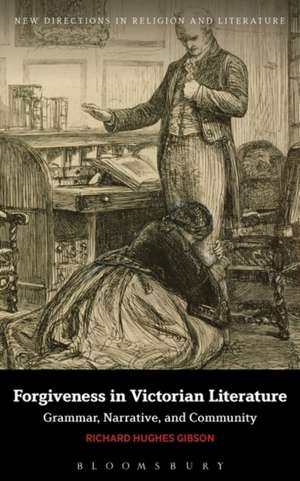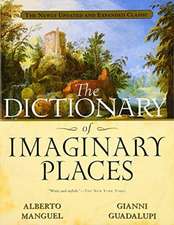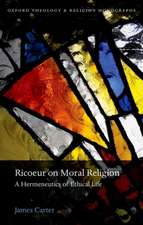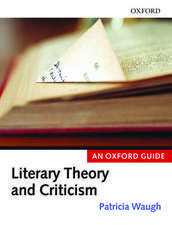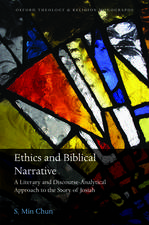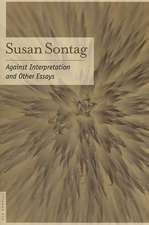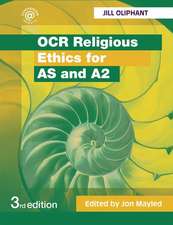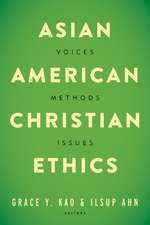Forgiveness in Victorian Literature: Grammar, Narrative, and Community: New Directions in Religion and Literature
Autor Dr Richard Hughes Gibsonen Limba Engleză Paperback – 21 sep 2016
| Toate formatele și edițiile | Preț | Express |
|---|---|---|
| Paperback (1) | 254.55 lei 6-8 săpt. | |
| Bloomsbury Publishing – 21 sep 2016 | 254.55 lei 6-8 săpt. | |
| Hardback (1) | 595.58 lei 6-8 săpt. | |
| Bloomsbury Publishing – 28 ian 2015 | 595.58 lei 6-8 săpt. |
Din seria New Directions in Religion and Literature
-
 Preț: 192.27 lei
Preț: 192.27 lei - 30%
 Preț: 509.20 lei
Preț: 509.20 lei - 30%
 Preț: 509.86 lei
Preț: 509.86 lei - 30%
 Preț: 510.03 lei
Preț: 510.03 lei - 24%
 Preț: 195.56 lei
Preț: 195.56 lei -
 Preț: 176.86 lei
Preț: 176.86 lei - 21%
 Preț: 215.96 lei
Preț: 215.96 lei - 14%
 Preț: 175.91 lei
Preț: 175.91 lei - 30%
 Preț: 566.83 lei
Preț: 566.83 lei - 23%
 Preț: 190.87 lei
Preț: 190.87 lei - 21%
 Preț: 217.35 lei
Preț: 217.35 lei - 24%
 Preț: 195.37 lei
Preț: 195.37 lei - 23%
 Preț: 254.55 lei
Preț: 254.55 lei - 14%
 Preț: 176.44 lei
Preț: 176.44 lei - 24%
 Preț: 188.55 lei
Preț: 188.55 lei - 12%
 Preț: 215.88 lei
Preț: 215.88 lei - 14%
 Preț: 196.96 lei
Preț: 196.96 lei - 23%
 Preț: 192.55 lei
Preț: 192.55 lei - 14%
 Preț: 183.70 lei
Preț: 183.70 lei - 23%
 Preț: 191.38 lei
Preț: 191.38 lei - 23%
 Preț: 254.02 lei
Preț: 254.02 lei - 14%
 Preț: 176.86 lei
Preț: 176.86 lei - 14%
 Preț: 164.59 lei
Preț: 164.59 lei - 24%
 Preț: 190.33 lei
Preț: 190.33 lei - 13%
 Preț: 229.86 lei
Preț: 229.86 lei - 30%
 Preț: 508.95 lei
Preț: 508.95 lei - 30%
 Preț: 540.54 lei
Preț: 540.54 lei -
 Preț: 176.44 lei
Preț: 176.44 lei - 23%
 Preț: 235.00 lei
Preț: 235.00 lei
Preț: 254.55 lei
Preț vechi: 329.64 lei
-23% Nou
Puncte Express: 382
Preț estimativ în valută:
48.71€ • 50.85$ • 40.31£
48.71€ • 50.85$ • 40.31£
Carte tipărită la comandă
Livrare economică 05-19 aprilie
Preluare comenzi: 021 569.72.76
Specificații
ISBN-13: 9781350003750
ISBN-10: 1350003751
Pagini: 184
Dimensiuni: 138 x 216 x 15 mm
Greutate: 0.22 kg
Ediția:NIPPOD
Editura: Bloomsbury Publishing
Colecția Bloomsbury Academic
Seria New Directions in Religion and Literature
Locul publicării:London, United Kingdom
ISBN-10: 1350003751
Pagini: 184
Dimensiuni: 138 x 216 x 15 mm
Greutate: 0.22 kg
Ediția:NIPPOD
Editura: Bloomsbury Publishing
Colecția Bloomsbury Academic
Seria New Directions in Religion and Literature
Locul publicării:London, United Kingdom
Caracteristici
Opens new directions in narratology by examining linguistic and structural roles of forgiveness in literature.
Notă biografică
Richard Hughes Gibson is Assistant Professor of English Literature at Wheaton College, USA.
Cuprins
PrefaceAcknowledgements1 Introduction: Grammar, Narrative, and Community2 Dickens and Forgiveness in 1846: Liberality and Liability3 Forgiving in Community: Trollope's The Vicar of Bullhampton and Eliot's Adam Bede4 Forgiving in the Nineties: Hardy's Jude the Obscure and Wilde's De ProfundisBibliographyIndex
Recenzii
In working out that the past cannot be erased or forgotten, but that psychological healing is possible through both extraordinary and everyday acts, Gibson's incisive analysis of the plot arcs of Victorian fiction casts light on more modern quests for effective reconciliatory processes.
Gibson's book includes some excellent analysis of individual texts from the Victorian period and discriminates carefully between the various attitudes to forgiveness that were evident at that time.
With this book, Richard Gibson has earned the right to be counted among the very best of a new cohort of Victorian literary scholars who engage religion with learned sophistication. As forgiveness is inevitability enacted by people in time, novels are particularly rich sources for exploring how the Victorians wrestled with this theologically-infused, worrisome concept. Forgiveness in Victorian Literature makes a significant and original contribution to our understanding of nineteenth-century religion, society, and literature.
An extraordinarily sensitive and nuanced treatment of an extraordinarily important subject. Professor Gibson clearly demonstrates the ubiquity of the language of forgiveness in the Victorian era, but rather than offering a unitary and therefore simplistic account of this theme, he demonstrates its enormous complexity. Sometimes overtly Christian, sometimes almost anything but, the grammar of forgiveness finds its serpentine way into every remote corner of Victorian literary culture. Richard Gibson is a superb guide to this phenomenon.
Forgiveness is, in this splendid and wide-ranging study, grounded in telling and retelling accounts of offence. Richard Gibson gives fresh, original readings of the works of Dickens, Eliot, Trollope, Hardy, and Wilde by showing how central are the narrative strategies and social possibilities of forgiveness to their accounts of reconciliation and its difficulties. An exhilarating treatment that deserves a wide readership.
Gibson's book includes some excellent analysis of individual texts from the Victorian period and discriminates carefully between the various attitudes to forgiveness that were evident at that time.
With this book, Richard Gibson has earned the right to be counted among the very best of a new cohort of Victorian literary scholars who engage religion with learned sophistication. As forgiveness is inevitability enacted by people in time, novels are particularly rich sources for exploring how the Victorians wrestled with this theologically-infused, worrisome concept. Forgiveness in Victorian Literature makes a significant and original contribution to our understanding of nineteenth-century religion, society, and literature.
An extraordinarily sensitive and nuanced treatment of an extraordinarily important subject. Professor Gibson clearly demonstrates the ubiquity of the language of forgiveness in the Victorian era, but rather than offering a unitary and therefore simplistic account of this theme, he demonstrates its enormous complexity. Sometimes overtly Christian, sometimes almost anything but, the grammar of forgiveness finds its serpentine way into every remote corner of Victorian literary culture. Richard Gibson is a superb guide to this phenomenon.
Forgiveness is, in this splendid and wide-ranging study, grounded in telling and retelling accounts of offence. Richard Gibson gives fresh, original readings of the works of Dickens, Eliot, Trollope, Hardy, and Wilde by showing how central are the narrative strategies and social possibilities of forgiveness to their accounts of reconciliation and its difficulties. An exhilarating treatment that deserves a wide readership.
